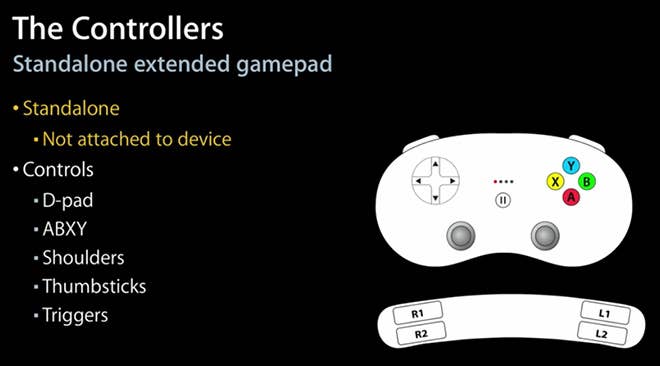What does iOS 8 Metal Mean for Gaming?
Earlier this week, Apple announced Metal, a new API that enables developers to produce "console quality" games for iOS devices. Should Sony and Microsoft be worried?
This article first appeared on USgamer, a partner publication of VG247. Some content, such as this article, has been migrated to VG247 for posterity after USgamer's closure - but it has not been edited or further vetted by the VG247 team.
Over the years, iOS devices have become an increasingly important part of the gaming landscape, despite what feels like Apple’s lack of serious support and promotion of them as gaming machines.
But is that about to change? At this year’s WWDC keynote, Apple’s head of software, Craig Federighi, unveiled Metal, an API that's integrated into the upcoming iOS 8 and designed to supersede the current 3D graphics API - the industry standard, OpenGL (Open Graphics Library). Like OpenGL, Metal enables the CPU and GPU of an iOS device to optimally work together to create 3D graphics. In this case, allowing developers to work with Apple’s A7 system-on-a-chip processor – the one found in the latest generation of iPhones, iPads and iPad Minis - apparently more effectively than they have been able to in the past.
Federighi went on the offensive against the 22-year old OpenGL standard, claiming that it has become an increasingly “thick layer of overhead between the game and the hardware,” and that Metal would essentially deliver, “near bare-to-the-metal access to the power of A7,” and a “dramatic” draw rate increase by a factor of 10. The results of which will “enable game providers for the first time to bring console-class 3D games to mobile devices”.

While Kool-Aid marketing rhetoric like this always needs to be taken with a fair pinch of salt, Tim Sweeney, CEO of Epic games, took to the stage to help put Apple’s money where its mouth is. He showcased a UE4 demo called Zen Garden running on an iOS 8 iPad. It was certainly impressive – a photorealistic 3D house and tranquil environment with a few pretty tricks up its sleeve designed to show off reflections, water and lighting effects, and particle/cloud movement. There were fish swimming in a pool, cherry blossoms being blown from branches, and complex objects with many different textures being rendered very smoothly. As demos go, it was indeed impressive.
Metal is also currently in the hands of Crytek, EA (or more specifically, DICE), and Unity – all 3D graphic specialists in their own right. EA has already created a Plants vs. Zombies demo, a short clip of which was shown and described as a “console-level title.”
“Console quality” seems to be a key mantra of Metal’s marketing message. While I’m sure that none of the console manufacturers are particularly concerned by this announcement, it does nevertheless signal that Apple is finally beginning to take gaming a little more seriously, and is perhaps moving in the right direction.

Or does it? I thought that Apple had also taken a big step forward for gaming this time last year at WWDC 2013 when it announced its MFi controller program. At last! A universal system that enables developers to create games that are compatible with every controller designed around the new, approved, standardized iOS control system. Surely this would be a huge leap forward for iOS gaming? Unfortunately it was not, and a year later the program has yet to take flight. The range of iOS controllers has grown very slowly, and developers haven't fully embraced the standard. Some have – most of whom you’d consider serious game developers – but the vast majority haven't. End result: you can spend $100 on a beautifully designed, top-of-the-line controller, but quite likely not be able to use it to play most of your favorite iOS games.
If Apple wants the MFi program to be taken seriously, it should be putting more effort into encouraging developers to make their games controller compatible, and also promoting iOS devices together with third-party MFi controllers – so that users understand that they work together. Perhaps it’s even time for Apple to step up and make its own MFi gaming controller – or if the creation of an all-white, minimalist controller is beyond Apple’s means, at the very least get fully behind a third party controller, such as the excellent SteelSeries Stratus (which Apple already sells on its official online store).

But what I find particularly disappointing – and it’s been a beef of mine since the app store's early days – is simply the way Apple sells its games. The app store’s discovery system is miserable, and finding games beyond what can be found on the front page and in its featured collections basically requires digging through mountains of junk to find hidden gems - an exercise ironically similar to the myriad of hidden object games that can be found on the store.
Finding MFi games is even more challenging. The best way to do so is to look online or download an app. Not really a problem for those who are actively aware of the existence of these games – but the point here is to reach the millions of iOS gamers who don’t know about MFi games and controllers. Perhaps if Apple added an MFi games category, or simply promoted MFi-compatible games and controllers on the front page of the app store games section, users would become aware of them and perhaps demand would begin to rise. Let’s face it, for any universal standard to be adopted by users and developers, it needs to be presented front and center and pushed hard.
The current failure of MFi devices to catch on could always be blamed on the fact that most iOS gamers fall into the “casual” category, and the majority of iOS games cater for that audience. But despite that, there is a vast, vast number of “real” gamers who play on iOS, even though they might be in a minority compared to the mass-market casuals. It's also true that many of the greatest iOS games are designed specifically for the system, and use touch mechanisms that transcend physical controllers – my favorite Plague, Inc falls into that category.

But the thing is, while many touch-specific games are outstanding, many gamers also want to play the kind of games they’ve been playing with controllers for the last four decades – the type not necessarily suited for iOS devices. They would be if MFi controllers were a standard – but that isn’t the case right now. If it were, perhaps we’d also see many more console games being ported across to iOS.
Or maybe we wouldn’t – because the economics of iOS development is fraught with challenges. While Metal might well help developers deliver console-quality graphics, they won’t necessarily be able to charge console-quality prices for their products – and that does put limits on the kinds of games we’ll be seeing on iOS. Making iOS games is a risky business, because it's a hits-driven business where only a few games really make out, and most games sink without a trace, lost in those giant heaps of junk I was talking about earlier.
We're back to discovery and what I think serious iOS gaming software needs – and that's an effective sales machine. With app sales and revenue both in the billions, it’s hard to think that Apple would want to fix something that clearly isn’t broken, but in terms of serious gaming, it is. There’s nothing particularly wrong with the app store when it just comes to selling games – despite it being a pain in the ass to browse. But if Apple really does want to address the more serious gaming market, it needs a new gaming section on the app store. One that features higher-end products, promotes MFi compatibility, and ultimately feels like a destination for serious gaming.
If that were to happen, I think that might really mean something for the games business. But I really can't see that happening, so for now and for the foreseeable future, it’s business as usual.
“Console quality” business as usual.
